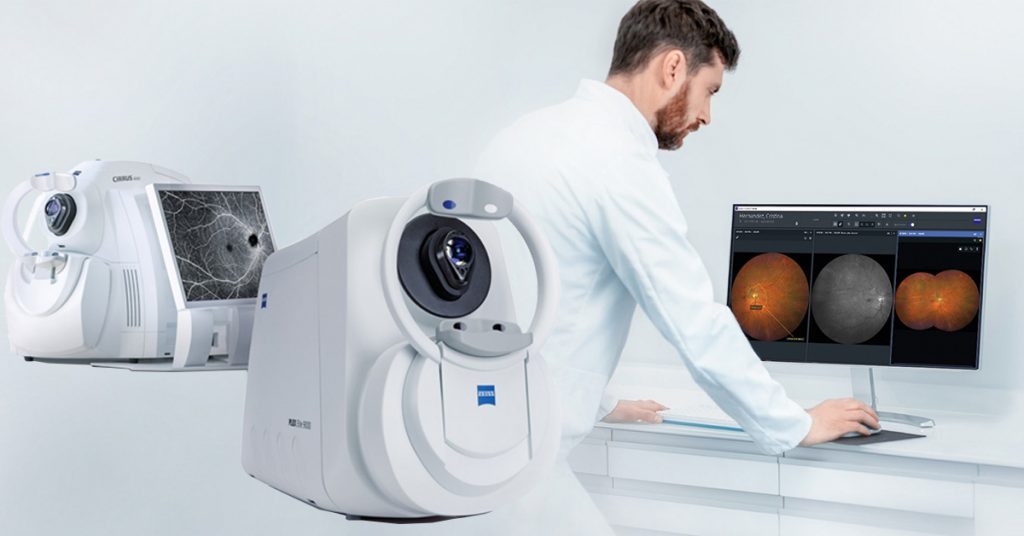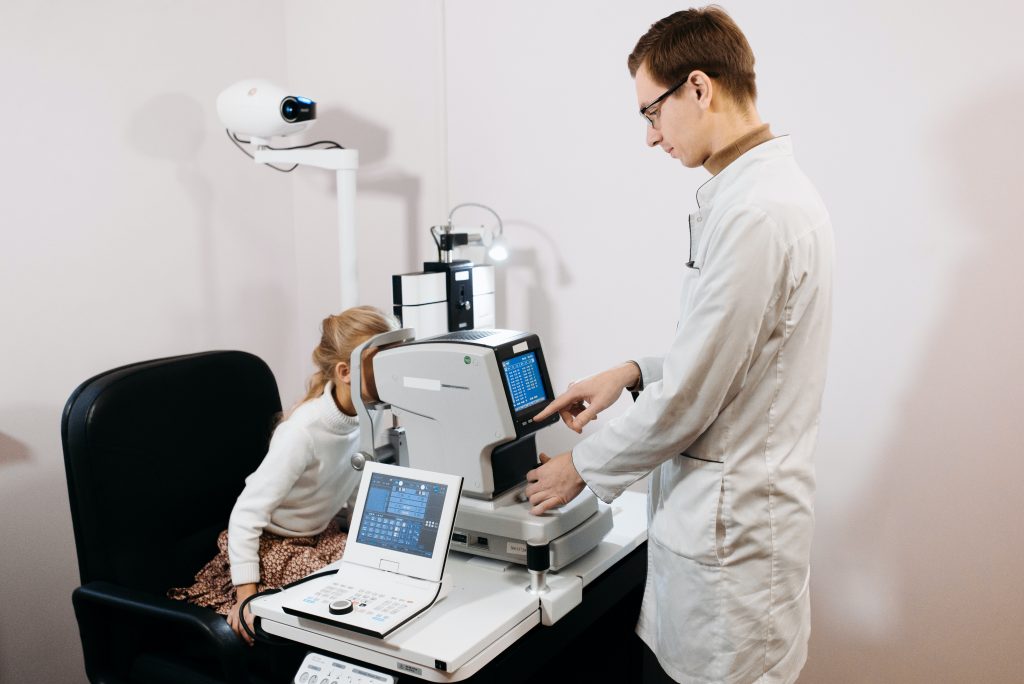Book an Appointment
One of our team members will call you to book your appointment.
Macular degeneration
Also known as 'AMD'
What is macular degeneration
Macular degeneration, also known as age-related macular degeneration (AMD), is a common eye condition and a leading cause of vision loss among people age 50 and older. It involves the deterioration of the macula, which is the small central area of the retina that controls visual acuity. The macula’s health is crucial for tasks requiring sharp vision, such as reading, driving, recognising faces, and seeing objects in fine detail.
Macular degeneration is categorised into two types:
Dry (Atrophic) AMD: This is the more common form, accounting for approximately 90% of cases. It occurs when the macula gets thinner with age, and small clumps of protein called drusen grow. Vision loss in dry AMD usually progresses slowly.
Wet (Neovascular) AMD: Though less common, wet AMD is more severe and can lead to faster loss of vision. It happens when abnormal blood vessels grow under the retina and leak fluid and blood, damaging the macula.
These are the symptoms of Macular Degeneration:
- Blurred or reduced central vision in one or both eyes.
- Difficulty seeing in low light conditions.
- Visual distortions, such as straight lines appearing wavy or bent.
- Difficulty recognising faces.
- A dark, blurry area or whiteout appearing in the center of vision.
- Color perception changes or dullness.


How can AMD be treated?
Treatment for macular degeneration (AMD) varies depending on whether the condition is in its early stages, its type (dry or wet), and the severity of the vision loss. Here’s an overview of the current treatment approaches:
While there’s no cure for dry AMD, which is the more common form, certain strategies can help manage the condition and slow its progression:
- Dietary Supplements: The AREDS2 formula, a combination of antioxidants and zinc, has been shown to slow the progression in people with moderate to advanced stages of the disease. This formula includes vitamins C and E, lutein, zeaxanthin, zinc, and copper.
- Lifestyle Changes: Maintaining a healthy lifestyle can help manage AMD. This includes a diet rich in leafy greens and fish, regular exercise, not smoking, and managing blood pressure and cholesterol levels.
- Low Vision Aids: Devices such as magnifying glasses, special eyeglass lenses, and electronic devices can help those with significant vision loss to maintain independence and quality of life.
- UV Protection – From 100% UV Blocking Polarised Lenses
Wet AMD can progress rapidly, but several treatments are available to slow the loss of vision:
- Anti-VEGF Therapy: The most common and effective treatment involves injecting medications into the eye that block vascular endothelial growth factor (VEGF), a protein that stimulates the growth of abnormal blood vessels in the retina. These injections, which may be needed monthly or bimonthly, can slow vision loss and, in some cases, improve vision.
- Laser Therapy: Laser treatment can sometimes be used to destroy actively growing abnormal blood vessels. A high-energy laser beam is aimed at the vessels to create small burns that seal the leaks.
- Photodynamic Therapy (PDT): PDT involves injecting a light-sensitive drug into the bloodstream, which is absorbed by the abnormal blood vessels in the eye. A laser is then directed into the eye to activate the drug, destroying the blood vessels without damaging the surrounding tissue.
How can we help you if you have macular degeneration?
Excellent addition. Integrating these elements provides the “solution” part of the patient journey. Here is the updated version, weaving in the recommendations for supplements and lenses as a conclusive, action-oriented step.
Redefining Macular Degeneration Care: The Abra & Co Approach
When you are diagnosed with macular degeneration, you need more than just standard advice; you need a dedicated partner with a proactive, technologically advanced strategy to protect your precious sight. At Abra & Co, we have moved beyond the conventional approach to offer a new standard of macular care that gives you clarity, confidence, and control.
Our process is built on a deep, comprehensive understanding of your unique eyes. Here’s what you can expect when you entrust us with your vision:
1. We Establish Your Unique Retinal Blueprint
* What we do: Our first step is to capture a baseline measurement of your macula using state-of-the-art Optical Coherence Tomography (OCT).
* Why we do it: This isn’t just a photograph; it’s a high-definition, cross-sectional map of your retina’s delicate layers, accurate to a thousandth of a millimetre. This detailed blueprint is unique to you and allows us to detect the slightest changes over time, often long before you would notice them yourself. It is the ultimate early warning system for preserving your vision.
2. We Analyse Your Eye Health in 3D
* What we do: Using your retinal blueprint, we create a dynamic 3D visualisation of your macular structure.
* Why we do it: This immersive view allows us to meticulously inspect the health of every retinal layer, identifying the specific type of AMD and tracking its stability or progression with incredible precision. For you, this means we can clearly explain what is happening at the back of your eye, providing reassurance and a deeper understanding of your condition.
3. We Assess Your Vision in the Real World
* What we do: We go beyond the standard letter chart to assess a critical aspect of your sight called the Contrast Sensitivity Function (CSF).
* Why we do it: Your life isn’t lived reading black letters on a white screen. Contrast sensitivity affects how you see facial expressions, judge steps and curbs in low light, or drive in the rain. By measuring this, we understand the true impact of AMD on your everyday life, which is essential for the next step.
4. We Create Your Personalised Vision Strategy
* What we do: Based on our comprehensive analysis, we design a multi-faceted support plan. This includes advising on specific nutritional supplements where clinically appropriate, and prescribing the right advanced lens technology to maximise your vision.
* Why we do it: This is where our analysis translates into tangible improvements for you. Evidence-based supplements can provide a proactive way to support your macular health from the inside out. Simultaneously, we use your real-world vision data to recommend the best lens types, tints, and coatings that reduce glare and enhance contrast. This delivers the best possible correction, maximising your sight and helping you navigate your world with greater confidence and clarity.
At Abra & Co, our commitment is to provide a level of care that empowers you. By combining our expertise with world-class technology, we work with you to monitor, manage, and create a personalised strategy that is focused on one thing: helping you live your life as fully as possible.
SEE WHAT OUR CLIENTS HAVE TO SAY
Posted onTrustindex verifies that the original source of the review is Google. Pleasant atmosphere and very professional polite staffPosted onTrustindex verifies that the original source of the review is Google. I have just had my new glasses fitted from Abra and Co opticians Middleton. I was given excellent friendly service. I love the new colourful glasses that I chose. Thank you so much. Joyce RyderPosted onTrustindex verifies that the original source of the review is Google. Top drawer all the best gadgets good servicePosted onTrustindex verifies that the original source of the review is Google. Really friendly staff, they get the job done and a very comfortable environment. Easy to access on the main road and not too busyPosted onTrustindex verifies that the original source of the review is Google. Lovely staff, caring and very professional, I would not change my opticians.Posted onTrustindex verifies that the original source of the review is Google. Amazing customer service & experience, had eye test & found the perfect pair of glasses, had them fit perfectly. The choice of glasses are great aswell was hard to choose however they gave me advice on shapes and colours that suited mePosted onTrustindex verifies that the original source of the review is Google. Excellent professional service and they gave me an immediate appointment when I had a problem with my eye.Posted onTrustindex verifies that the original source of the review is Google. Honestly the best opticians I’ve been to! The team is so welcoming and accommodating, from day one they’ve taken the time to get to know me and my partner. The team always remember the little details from our last visit - which just makes all the difference. 100% would recommend they have a fantastic selection of frames available and spent the timely patiently helping me select the right glasses and then fitting me for contact lenses!! Thank you so much guys!!!Posted onTrustindex verifies that the original source of the review is Google. I've been looking everywhere for Tom Ford that I really like. They ordered them from Italy. With in 2 weeks I was wearing my new glasses which I love. This is the best opticians I have ever visited. Returning after Christmas for a different pair. 5 stars all the way.Posted onTrustindex verifies that the original source of the review is Google. Excellent service. Very professional .sohail and James were really friendly and professional. First rate service as always. I even got offered a cuppa!

